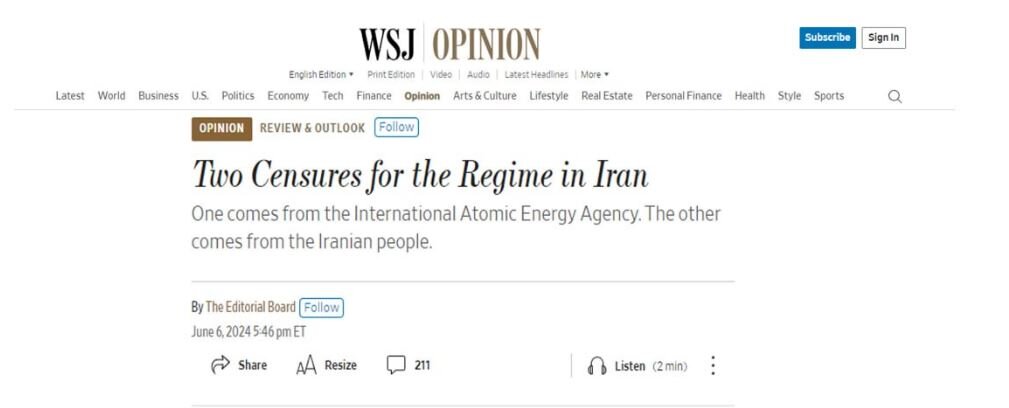Iranians call this ‘linking Gudarz to Shaqayeq’

TEHRAN- There are very few things in the world that seem to have no end. One of them is the tenacity of Israeli-affiliated media outlets in putting together baseless, false, and irrelevant information to undermine the regime’s enemies, no matter how desperate and unprofessional it may sound.
After asking the world to “let Israel be Israel” and turn a blind eye to the genocide of Palestinians, or suggesting that people should not “blame Israel first” despite its repeated crimes against humanity, the Wall Street Journal published an opinion piece on Thursday in what appeared to be an attempt to celebrate what the newspaper perceived as Iran's latest setbacks.
In an article titled “Two Censures for the Regime in Iran” WSJ’s editorial board hails the International Atomic Energy Organization’s Wednesday anti-Iran resolution as a step that could facilitate the implementation of "snapback," a mechanism that would reinstate terminated UN resolutions against Iran and effectively nullify the Joint Comprehensive Plan of Action (JCPOA).
The Wall Street Journal's article fails to mention that the IAEA resolution is non-binding and, therefore, will not impact Iran's nuclear program. What it could influence is the talking points of Western-aligned presidential candidates in Iran's upcoming snap elections, who have lost their bases among the Iranian populace long ago.
The article also omits the fact that the economic impact of "snapback" would likely not align with Western expectations. The United States has already withdrawn from the JCPOA and imposed significant sanctions on Iran, some of which are more severe and damaging than those outlined in the resolutions passed prior to the nuclear deal.
In other sections, the article discusses Biden's perceived reluctance to confront Iran. The Wall Street Journal's writers accuse Biden of providing Iran with billions of dollars by permitting it to sell oil (despite the fact that the U.S. has attempted to halt Iran's oil sales by seizing its tankers, a strategy it was forced to abandon after Iranian armed forces retaliated in the Persian Gulf) and of defending Tehran following its attacks against Israel (as if Israel and the U.S. chose to de-escalate tensions because of Biden's sympathy for Iran, rather than because they were unable to effectively counter Iran's limited attack, which was likely to be followed by a more devastating one in the event of another Israeli error).
After employing these assertions to argue that Iran is being weakened on the international stage and that its achievements in recent months were not the result of its own capabilities but rather due to Biden's avoidable failures, the article cites a recent incident to inform its readers that Iran is also losing influence domestically.
The second "censure" mentioned by the newspaper could be regarded as a new low in propaganda, even for a publication like the Wall Street Journal, which has shamelessly defended every untenable Israeli action over the past eight months.
The article talks about the recent arrest of a Mossad spy that it introduces as an editor and translator known for his “clever critique” of the Iranian government. According to the op-ed, Hossein Shanbezadeh was arrested because he commented a dot under a Twitter post by the Leader of the Islamic Revolution. It argues that the charges of espionage against the figure are false and that his detention happened because he had become a popular dissident of the Islamic Republic among the Iranian people.
Once again, the WSJ tells some lies and also omits some very important facts. The lie is that Shanbezadeh was not a well-known figure. He had gained some notoriety among anti-Iran Twitter users for insulting religious figures, but he in no way possessed widespread recognition within Iran.
What the WSJ doesn’t talk about is even more significant than its lies. If Shanbezadeh was merely an ordinary citizen exercising his right to criticize the government, why was he arrested while attempting to illegally cross Iran's border? Why was his Twitter account suspended immediately following his detention? And what did his Telegram messages reveal about his receipt of funds from Israel?
The Thursday op-ed by WSJ may evoke a well-known Persian idiom among Iranian readers. Some are going to read the article and question how the world-renowned newspaper managed to “link Gudarz to Shaqayeq”? that’s an expression used to describe the illogical and irrelevant combination of random facts to support a conclusion that lacks a logical basis.
Leave a Comment